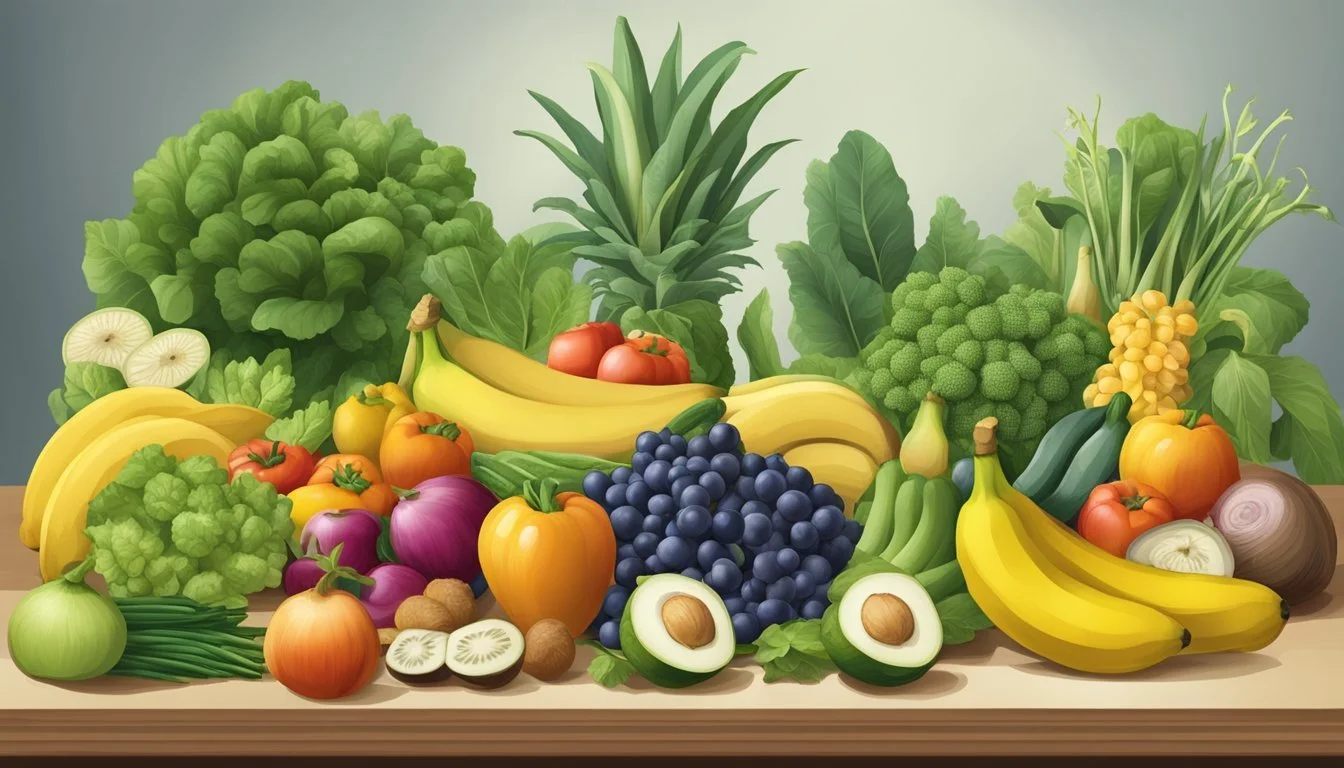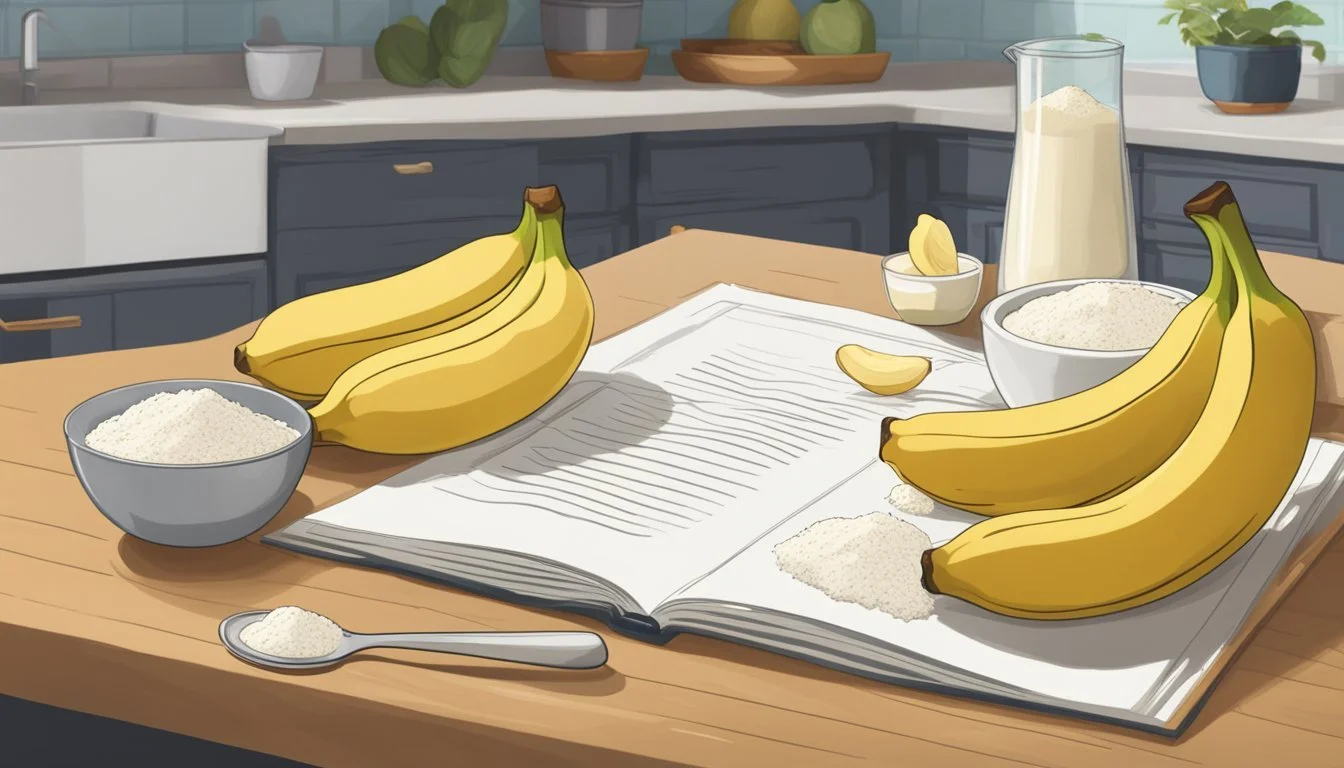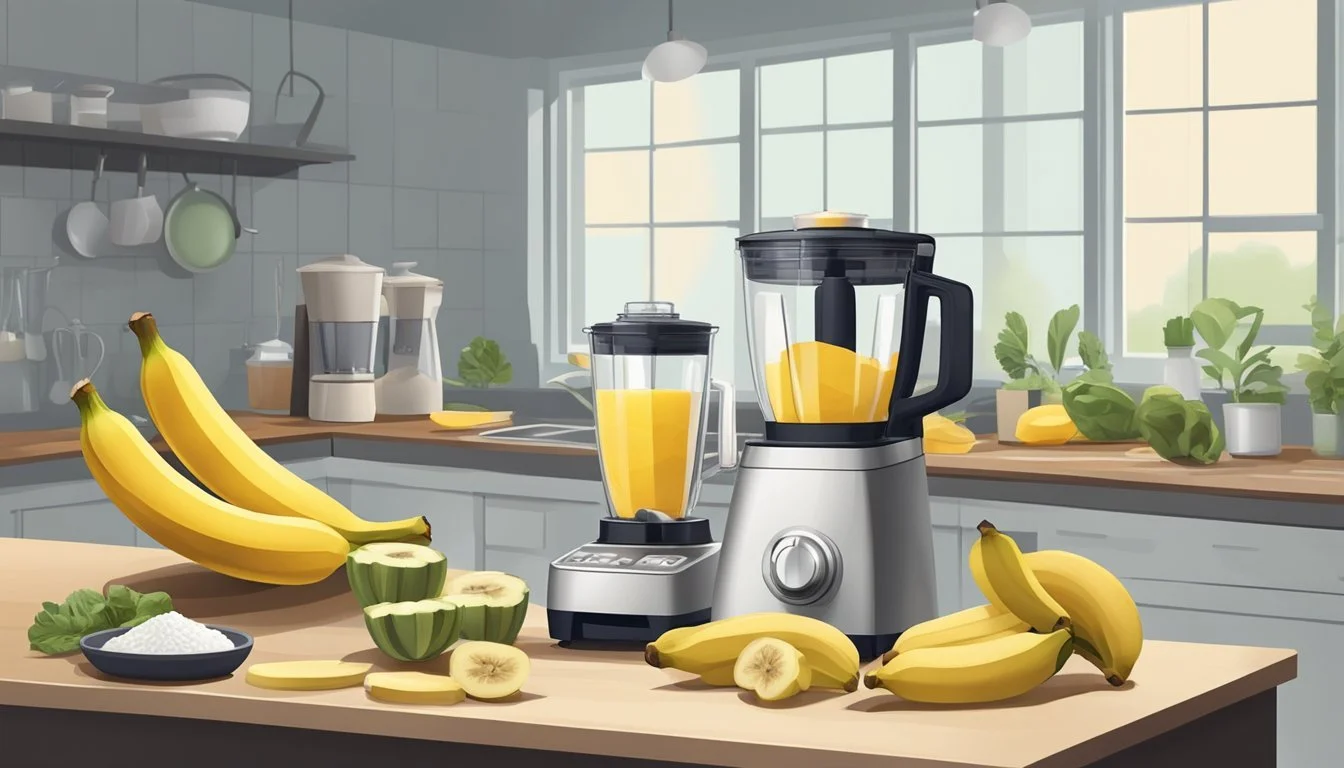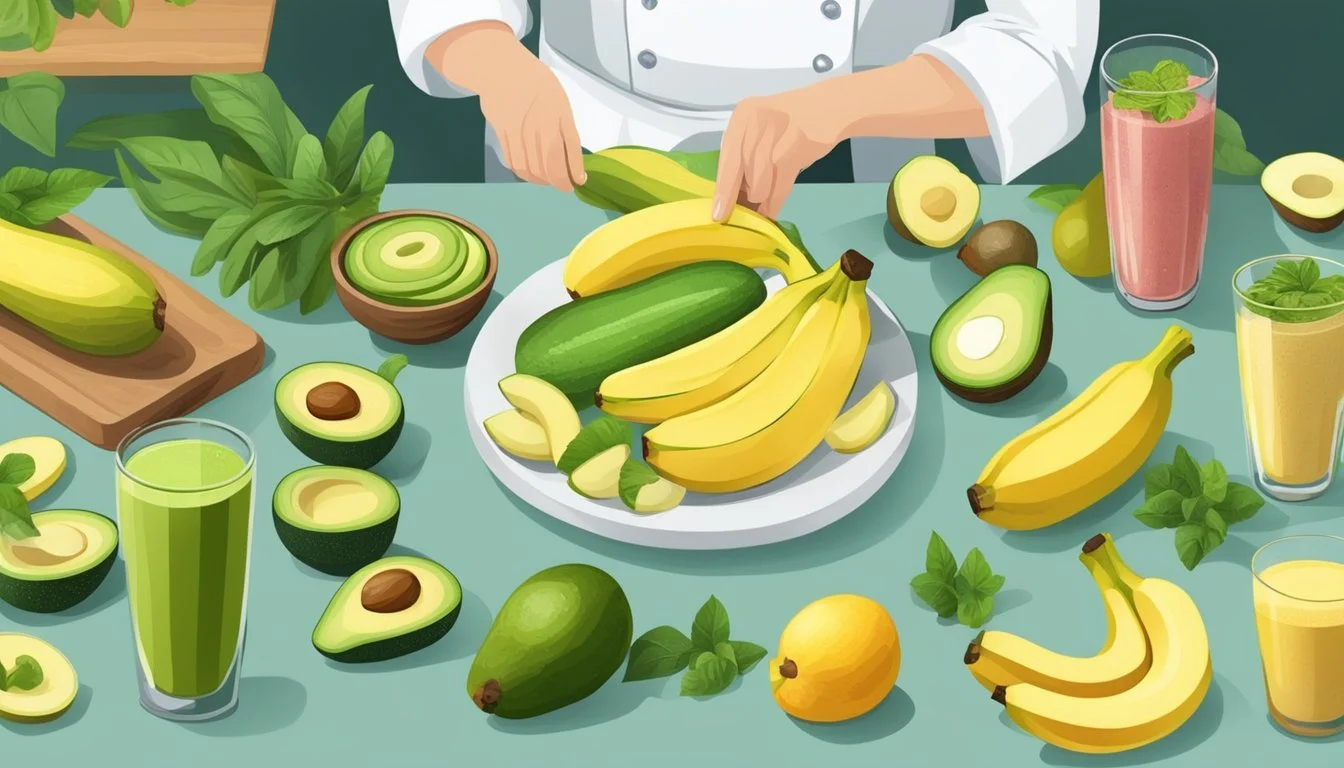Bananas Substitutes
Healthier and Delicious Alternatives
Bananas are a popular ingredient in many recipes, from smoothies to baked goods. Sometimes, though, you might need an alternative due to allergies, dietary restrictions, or simply running out of bananas. For those looking to replace bananas in their recipes, there are numerous substitutes like applesauce, avocado, Greek yogurt, and coconut cream that can provide a comparable texture and taste.
In smoothies, avocado, chia seeds, and mango can work well as banana substitutes, adding creaminess and nutritional benefits. For those who prefer baking, applesauce and oatmeal can serve as excellent alternatives, offering moisture and binding properties similar to bananas. When substituting bananas in recipes, it's important to consider the flavor and texture changes that each alternative will bring to achieve the best results.
Experimenting with different banana substitutes not only accommodates dietary needs but also opens up a world of culinary possibilities. From creamy coconut cream to versatile applesauce, these substitutes maintain the quality of the dish while offering unique flavors and benefits.
Understanding Banana Substitutes
Bananas play a unique role in baking due to their rich nutritional profile and the texture they bring to recipes. Exploring the substitutes for bananas involves examining their nutritional value and understanding their roles in different culinary contexts.
Nutritional Value of Bananas
Bananas are rich in vitamins and minerals. They provide potassium, which is essential for heart health, dietary fiber for digestive health, and antioxidants that help fight inflammation. Bananas also contain Vitamin C, magnesium, Vitamin B6, folate, manganese, and copper. This combination of nutrients supports immune function, energy production, and overall well-being. When choosing a substitute, consider how the alternative matches up nutritionally. For example, applesauce offers fiber and Vitamin C, while silken tofu provides protein and some vitamins but lacks potassium.
Roles of Bananas in Recipes
In baking, bananas contribute texture, moisture, sweetener, and flavor. They help bind ingredients together, making them ideal for egg-free and dairy-free recipes. Their natural sweetness can reduce the need for additional sugar, and their moisture content ensures a moist final product. When substituting, consider the purpose of the banana in the recipe. Eggs, silken tofu, and Greek yogurt can replicate the binding and moisture aspects. For sweetness, applesauce or honey can be effective. Cashew cream and coconut cream mimic the creamy texture, while maintaining a similar consistency. These adjustments ensure the final product remains balanced and flavorful.
Banana Substitutes for Baking
Using alternatives to bananas in baking can yield delicious results while preserving the intended moisture and texture of the final product. This section explores three effective substitutes: applesauce, pumpkin, and sweet potatoes.
Applesauce as a Substitute
Applesauce is a popular alternative for bananas in baking. It adds moisture and a subtly fruity flavor to cakes, muffins, and quick breads. To replace one banana, use ½ cup of applesauce. This can be especially beneficial in low-fat baking recipes, as applesauce contributes moisture without the additional fat from butter or oil.
One thing to note is that applesauce can make the batter runny. If the mixture seems too loose, add a bit more flour to achieve the desired consistency. Many bakers appreciate applesauce for its convenience and versatility in various recipes.
Pumpkin in Baked Goods
Pumpkin puree is another excellent substitute for bananas. It provides moisture and a rich, warm flavor, making it great for cakes, muffins, and quick breads. Swap one banana with ½ cup of pumpkin puree. The natural sweetness and vibrant color of pumpkin enhance the taste and appearance of baked goods.
When using pumpkin puree, it is important to consider the spices commonly paired with it, such as cinnamon and nutmeg, which can complement the pumpkin flavor. The substitution can also result in a denser texture, so adjust leavening agents if needed.
Sweet Potatoes for Moisture and Texture
Mashed sweet potatoes are a robust substitute for bananas in baking. They offer moisture and a creamy texture. To replace one banana, use ½ cup of mashed sweet potatoes. This makes sweet potatoes ideal for recipes needing density and moistness, such as rich cakes and muffins.
Sweet potatoes also bring a natural sweetness and a slight earthy flavor. Like pumpkin, sweet potatoes hold up well in recipes that call for spices. Adjust the baking time accordingly, as using sweet potatoes might require a few extra minutes in the oven to achieve the perfect bake.
Banana Substitutes in Other Recipes
Certain ingredients can stand in for bananas based on the desired texture and flavor. Alternatives like avocado, dairy substitutes, and binding agents like chia seeds and flaxseeds can effectively replicate banana’s attributes.
Avocado for Creaminess
Avocado is a remarkable substitute for bananas when seeking creaminess in recipes.
Mashed avocado provides a similar texture to mashed bananas, making it ideal for smoothies, puddings, and baked goods. Its creamy and neutral taste blend well with various ingredients without overpowering the final dish’s flavor.
Avocados are also rich in healthy fats, adding a nutritious boost. When using avocado in recipes, replace bananas 1:1 for a similar creamy consistency. It works particularly well in chocolate-based treats, lending a silky texture and subtle richness.
Dairy Alternatives
For those who prefer dairy-free options, ingredients like coconut cream, Greek yogurt, and silken tofu are suitable.
Coconut cream can replace mashed bananas in a 1:1 ratio. It adds creaminess and a slight coconut taste which complements tropical-inspired desserts.
Greek yogurt offers a tangy taste and creamy texture, making it an excellent choice for smoothies and baked goods. Use a half cup of Greek yogurt to replace one medium banana.
Silken tofu is another versatile option, especially in recipes like vegan cheesecakes and smoothies. It provides a smooth texture and mild flavor. Replace bananas with an equal amount of silken tofu for best results.
Chia Seeds and Flaxseed for Binding
Chia seeds and flaxseeds are effective for binding ingredients together, similar to bananas.
Chia seeds absorb liquid and swell, forming a gel-like substance. To make a chia seed substitute, mix 1 tablespoon of chia seeds with 3 tablespoons of water and let it sit for a few minutes.
Ground flax seeds work similarly. Create a flax egg by combining 1 tablespoon of ground flax seeds with 3 tablespoons of water. This mixture can replace one mashed banana.
Both chia and flax seeds are high in fiber and add nutritional value to recipes. They are particularly effective in pancakes, muffins, and bread where binding is crucial.
Dietary and Lifestyle Considerations
When looking for banana substitutes, it's essential to consider various dietary needs and lifestyle choices such as vegan alternatives, gluten-free options, and low-calorie solutions. The following sections address these needs with specific substitutes and their benefits.
Vegan and Egg Substitutes
For those following a vegan diet, a few excellent banana substitutes include silken tofu, soaked cashews, and applesauce. Silken tofu is perfect for smoothies and desserts, providing a creamy texture while being high in protein. Soaked cashews can be blended to a creamy consistency, replacing bananas in recipes like puddings and ice creams.
Applesauce is a versatile option that keeps baked goods moist and adds a subtle sweetness. Using 1/2 cup of applesauce can replace one banana in recipes. This is particularly helpful for those who want to avoid fruits. Each of these substitutes can easily be found in most kitchens and incorporated into a variety of dishes.
Gluten-Free and High-Fiber Options
Bananas are often valued for their fiber content, so finding substitutes that fit a gluten-free diet while being high in dietary fiber is essential. Ripe plantains, sweet potatoes, and oats are reliable choices. Ripe plantains offer a similar texture and can be used in many recipes from baking to smoothies.
Sweet potatoes are loaded with dietary fiber and provide a natural sweetness that is perfect for baked goods. Oats can be used as a base for many breakfast dishes and add a good amount of fiber. These options not only cater to gluten-free diets but also help meet daily fiber requirements.
Low-Calorie and Sugar-Free Solutions
For those looking to reduce calorie intake or avoid sugars, there are several suitable substitutes for bananas. Greek yogurt provides creaminess along with a protein boost, making it an ideal addition to smoothies without adding too many calories. Coconut cream is another versatile substitute, offering a rich texture while being lower in calories than traditional creams.
For a sugar-free alternative, pumpkin puree is notable. It adds moisture to baked goods without the added sugars found in bananas. These options cater to different dietary needs, making it easier to enjoy recipes while maintaining a healthier lifestyle.
In summary, whatever your dietary needs or preferences may be, there is likely a banana substitute that can meet your requirements while maintaining taste and texture in your favorite recipes.
Practical Considerations for Substitutes
Choosing the right banana substitute involves considering several factors including taste and texture similarities, availability during different seasons, and comparative costs. Each aspect plays a vital role in ensuring the substitute works well in the chosen recipe.
Taste and Texture Comparisons
Bananas offer a unique blend of sweetness and smooth texture. Alternatives like Greek yogurt add a tangy flavor and creamy texture. Silken tofu provides a smooth, mild nutty flavor.
Eggs offer a similar binding property with a neutral taste but adjust for a fluffier texture. Sweet potatoes contribute a creamy texture and sweeter note, making them ideal for richer recipes. Applesauce maintains the natural sweetness and similar consistency to bananas.
Availability and Seasonality
Availability of substitutes varies. Mangoes, often accessible year-round but peak in summer, provide a tropical flavor. Sweet potatoes and applesauce are frequently available in most seasons.
Silken tofu and Greek yogurt are easily found in grocery stores year-round, making them accessible options. Coconut cream can be found in the canned goods section and isn't limited by seasonality, ensuring consistent availability.
Cost and Storage
Cost and storage are crucial. Eggs are typically affordable and have a decent shelf life when refrigerated. Silken tofu and Greek yogurt are moderately priced but may require refrigeration, which affects storage.
Sweet potatoes and applesauce offer economical choices and can be stored longer without refrigeration. Coconut cream is cost-effective per use and has a long shelf life when unopened. Balancing cost with storage needs helps in choosing the appropriate substitute.
Techniques and Kitchen Equipment
Utilizing specific techniques and the right kitchen equipment can significantly enhance your baking experience when using banana substitutes. Important methods and tools include blending, pureeing, and careful baking adjustments.
Blending and Pureeing Alternatives
A blender or food processor is crucial for creating smooth and consistent banana substitutes. For instance, pureed fruit like applesauce or pureed beans can be blended until they reach a uniform texture suitable for baking.
Using plain yogurt or Greek yogurt as a substitute involves blending to ensure the texture is smooth. This technique helps incorporate the substitute evenly into the batter, maintaining the desired consistency and moisture.
Substitutes like silken tofu or avocado also benefit from blending. These high-fat content ingredients provide a rich texture similar to bananas.
Baking with Substitutes
When baking with these alternatives, adjustments are often necessary. Using shredded zucchini, for instance, requires squeezing out excess moisture to prevent a soggy product.
Prunes and other dried fruits must be rehydrated and pureed for even distribution within the batter.
It's important to consider the moisture and fat content of the substitutes. For example, coconut cream or cashew cream can replace the creaminess of bananas but might necessitate reducing other fats like butter or oil.
Accurately measuring the substitutes is essential. For substitutes like applesauce, using a 1:1 ratio is common. If using more than 1 cup, additional flour might be needed to balance moisture.
By mastering these techniques and utilizing the appropriate equipment, baking without bananas becomes straightforward and successful.
Creative Uses of Banana Substitutes
Exploring alternatives to bananas can lead to delightful culinary innovations. Different substitutes add unique flavors and textures to dishes, enhancing and diversifying recipes in unexpected ways.
For Enhanced Flavors
Using banana substitutes like sweet potatoes or berries can bring a fresh twist to traditional recipes. Mashed sweet potatoes are excellent for adding a rich, earthy flavor with a hint of sweetness. They are not only tasty but also packed with vitamins A and C, providing nutritional benefits.
Berries, such as blueberries or strawberries, can be blended into smoothies for a vibrant, tangy twist. They offer an abundance of antioxidants and can complement other flavors effectively, making them versatile ingredients in beverages and baked goods.
Innovative Textures in Recipes
The texture of banana substitutes can significantly transform a dish. Silken tofu, for example, provides a smooth, creamy consistency ideal for puddings and mousses.
Greek yogurt can introduce a tangy creaminess, perfect for adding body to pancakes or protein bars. On the other hand, mashed sweet potatoes bring a hearty, dense texture, which works beautifully in cakes and bread.
Another creative option is to use ground oats. When finely ground, oats can substitute for bananas, offering a slightly nutty flavor and a firm texture that holds up well in baking. By experimenting with these alternatives, one can discover new dimensions of taste and texture in both sweet and savory dishes.






